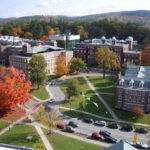What Is Wake Forest University Known For?
What’s Covered:
- Overview of Wake Forest University Admissions
- Unique Aspects of Wake Forest University
- What Are Your Chances of Acceptance at Wake Forest?
Are you looking for a small-ish school located within driving distance of mountains and beaches, and NCAA Division I athletics teams? If so, Wake Forest University may be the perfect college for you!
In this post, we’ll provide an overview of the important aspects of being a student at Wake Forest, like academics, extracurriculars, and traditions, and share everything you need to know about the admissions process.
Overview of Wake Forest University Admissions
Location: Winston-Salem, North Carolina
Undergrad Enrollment: 5,200
Acceptance Rate: 32%
Middle 50% SAT: 1300-1460
Middle 50% ACT: 30-33
Wake Forest University admissions are selective—only 32% of applicants are accepted. To increase your chances of acceptance, you should first meet or exceed the academic standards of previously-accepted students. Then, it’s important to have impressive extracurriculars and standout essays.
It’s important to note that standardized testing is optional at this college due to COVID. However, you should generally submit your SAT or ACT score it is above the 25th percentile, as students with scores are accepted at higher rates than those without.
Unique Aspects of Wake Forest University
Academics
Wake Forest University offers 45 undergraduate majors and 60 undergraduate minors in its six colleges:
- Wake Forest University School of Law
- Wake Forest University School of Divinity
- Wake Forest University School of Business
- Wake Forest Graduate School of Arts and Sciences
- Wake Forest University School of Medicine
The most popular majors at Wake Forest University include the Social Sciences, Business, Management & Marketing, and Communications & Journalism.
Notable faculty include Anthony Atala, the director of the Wake Forest Institute for Regenerative Medicine, who is considered a national pioneer in organ growth, and David Carroll, a professor of physics and director of the Center for Nanotechnology and Molecular Materials, known for his research in nanoengineered cancer therapies.
Wake Forest University has a notable business school. The 20-month MBA program is the #1 part-time MBA program in North Carolina, designed specifically for working professionals.
Wake Forest University is also known for its study abroad culture. Over 80% of Wake Forest undergraduates have studied abroad in recent years. Wake Forest owns four residential study centers abroad in Venice, London, Vienna, and Nicaragua. Many students take advantage of these study abroad opportunities, as well as the university’s other 400 study abroad programs in 200 cities in over 70 countries around the world.
Extracurriculars
Wake Forest University offers over 200 student organizations, including 24 fraternities and sororities.
Wake Forest is the smallest school in the Atlantic Coast Conference and offers NCAA Division I athletics for football, basketball, field hockey, soccer, tennis, and other sports. The teams are called the “Demon Deacons” and have won a total of nine NCAA team national championships in five different sports including women’s field hockey, men’s golf, men’s soccer and men’s baseball, and men’s tennis.
Wake Forest is part of “Tobacco Road” or “The Big Four”, terms that refer to the four North Carolina schools (Duke, North Carolina, and North Carolina State) that have a strong rivalry within the ACC.
Wake Forest also offers club and intramural sports for non-student athletes, which many students take advantage of. In fact, over half of the student body participates in the 18 different intramural sports.
Traditions
Wake Forest has several traditions for students to participate in. Some of the most popular include Project Pumpkin, Wake ‘N’ Shake, and Hit the Bricks.
- Project Pumpkin is an annual event hosted by the Office of Civic and Community Engagement that pairs hundreds of kids in the Winston-Salem community with Wake Forest students for trick-or-treating and carnival games on campus.
- Wake ‘N’ Shake is a 12-hour fundraising event for curing cancer, including dancing, singing, games, and inspirational speakers.
- Hit the Bricks is an annual eight-hour relay event that benefits the Brian Piccolo Cancer Drive.

Dorms
Wake Forest University has over 25 on-campus housing options for students. Most students live on-campus or within walking distance of campus.
Wake Forest guarantees housing for students during all four years of their undergraduate degree. Students must live on-campus for three years unless they live with a parent or guardian in the Winston-Salem area.
First-year students cannot select their roommates or residence halls, but instead, roommates are matched based on a housing agreement that highlights lifestyle habits and values.
There are three main areas of housing:
- South Campus (First Year Student Housing): Babcock Hall, Bostwick Hall, Johnson Hall, Luter Hall, Collins Hall, South Hall, Angelou Hall
- Quad Area (Upperclass Student Housing): Kitchin Hall, Davis Hall, Poteat/Huffman Halls, Taylor/Efird Halls
- North Area (Upperclass Student Housing): Magnolia Hall, Dogwood Hall, Polo Hall, Martin Hall, Palmer Hall, Piccolo Hall, North Campus Apartments, Student Apartments, Polo Road houses area.
Financial Aid
Wake Forest University offers a limited number of merit-based scholarships. However, most financial aid at Wake Forest is determined by financial need. The university is committed to meeting 100% of demonstrated financial need.
To acquire federal aid, students can begin to fill out the FAFSA as early as October 1st. For Wake Forest need-based scholarships, students can complete their CSS Profile as early as October 1st. If you’re hoping to earn a need-based scholarship, the university recommends applying before the priority dates.
Resources
Wake Forest University is located less than a mile from Reynolda Village, Reynolda Gardens, and the Reynolda House Museum of American Art. These properties used to be part of the 1,067-acre estate belonging to R.J. Reynolds, founder of the R.J. Reynolds Tobacco Company.
- Reynolda Village is a shopping center with shops, restaurants, and service providers.
- Reynolda Gardens are gardens including woodlands, wetlands, fields, and formal gardens. They are open daily with free admission and are a popular place for students to walk around, study, and exercise.
- The Reynolda House Museum of American Art is a museum that displays American art dating back to colonial times.
Location
Wake Forest is located in Winston-Salem, just 30 minutes from Greensboro, North Carolina. It is just under 150 miles from the mountains in Asheville, North Carolina, and just under 300 miles from the coastal cities of North Carolina, making it possible for weekend trips to the mountains and the coast.
What are Your Chances of Acceptance at Wake Forest University?
Even though Wake Forest University has a low admissions rate, your chances of acceptance may be higher than other students based on your unique combination of test scores, extracurriculars, class rank, and more.
To have a better understanding of your chances of acceptance at Wake Forest University, utilize our free chancing calculator. We’ll estimate your odds of acceptance based on your background, grades, test scores, and other important factors, and we’ll give you tips on how to improve your chances.
Based on your results, you can explore a list of best-fit schools to create a reliable strategy for the college application process.


